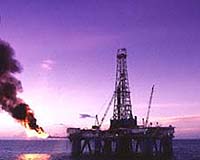 |
Buenos Aires, Argentina (SPX) Jun 29, 2009 Oil prices have been soaring since 2003. In 2008, oil prices went up as high as $100, showing the vulnerability of nonproducing countries to dependency of the imports of crude. This situation forced Latin American nonproducing countries to reorient its investments towards the renewable energies, with the purpose of diversifying its energy matrices. The situation was different for producing countries with significant amounts of 3P reserves, because high oil prices increased their investments in exploration and production (E and P) activities. New analysis from Frost and Sullivan, Peak Oil in Latin America: Present and Future Perspectives for the Oil and Gas Market, finds that the Latin American oil market produced 10.11 million barrels daily in 2008 and estimates this to reach 11.17 million barrels in 2014. Due to energy-efficiency trends, environmental regulation, and energy matrices reconfiguration, new technologies such as gasification (application IGCC), gas to liquid (GTL) or lignocellulosic ethanol will experience a high demand in Latin America in the years to come. A significant amount of investments is likely in upstream and downstream segments, such as deepwater E and P, FPSO (Floating Production, Storage and Offloading) vessels, liquefaction and regasification terminals, and refineries reconfiguration to treat extra-heavy crude oil. "Currently, in 2009, after taking into consideration the oil sands count, extra heavy crude oil, and deep water reservoirs, around 50 percent of the conventionally proven reserves in the world have been deployed," says Frost and Sullivan Industry Analyst Julio Campos. "Production costs are spiraling because oil and gas fields are becoming increasingly deeper." Latin American countries are seeking to diversify energy matrices with a majority having biofuel policies. For instance, wind farm construction is underway in Chile, Argentina, and Mexico even as other renewable fuels, such as biogas, are under development in almost all Latin American countries. In Colombia, a country with large coal reserves, innovative technologies are under development to capitalize on the coal mine-associated methane that is produce. Petroleos de Venezuela (PDVSA) intends to invest approximately $125 billion in 2013 in various projects, under the 'oil sowing plan', which includes six development projects. One of them includes treating or upgrading extra heavy crude projects in the Orinoco basin. Oil-producing countries should invest in exploration to replenish reserves. This will involve significant investments in new technologies, such as magneto telluric, aerial and terrestrial magnetometry, radiometry, teledection, 2D and 3D seismic, and gravimetrics. "It is vital to invest and sign agreements to capitalize on deepwater E and P existing technologies to drill in 'ultra-deep' and 'pre-salt' oil fields, such as technologies developed by companies such as Petrobras or StatoilHydro," explains Campos. "Furthermore, Mexico should utilize Petrobras technologies in the Gulf of Mexico. Those technologies were successfully used in the exploration of pre-salt Campos and Santos basins. In Mexico, 29 of the 36 main oil wells are declining and mature oil fields support 92 percent of oil production. "In countries such as Brazil or Venezuela, large investments in innovative technologies are expected to focus on pre-salt discoveries in Brazil; heavy oil upgrading, such as the Venezuelan 'swata sweet' made of extra-heavy oil from the Orinoco Basin; and the construction of refineries and transport infrastructure for oil, gas and derivatives," concludes Campos. Share This Article With Planet Earth
Related Links Frost and Sullivan Powering The World in the 21st Century at Energy-Daily.com
 Venezuela to borrow to pay oil debts
Venezuela to borrow to pay oil debtsCaracas, Venezuela (UPI) Jun 26, 2009 Venezuelan Oil Minister Rafael Ramirez' announcement that the state will borrow more money to help pay off national oil company debts follows the disclosure by President Hugo Chavez of a letter urging Moscow to cooperate in selling oil at $100 a barrel. State petroleum company Petroleos de Venezuela has run up billions of dollars in debts to contractors since global oil prices began ... read more |
|
| The content herein, unless otherwise known to be public domain, are Copyright 1995-2009 - SpaceDaily. AFP and UPI Wire Stories are copyright Agence France-Presse and United Press International. ESA Portal Reports are copyright European Space Agency. All NASA sourced material is public domain. Additional copyrights may apply in whole or part to other bona fide parties. Advertising does not imply endorsement,agreement or approval of any opinions, statements or information provided by SpaceDaily on any Web page published or hosted by SpaceDaily. Privacy Statement |